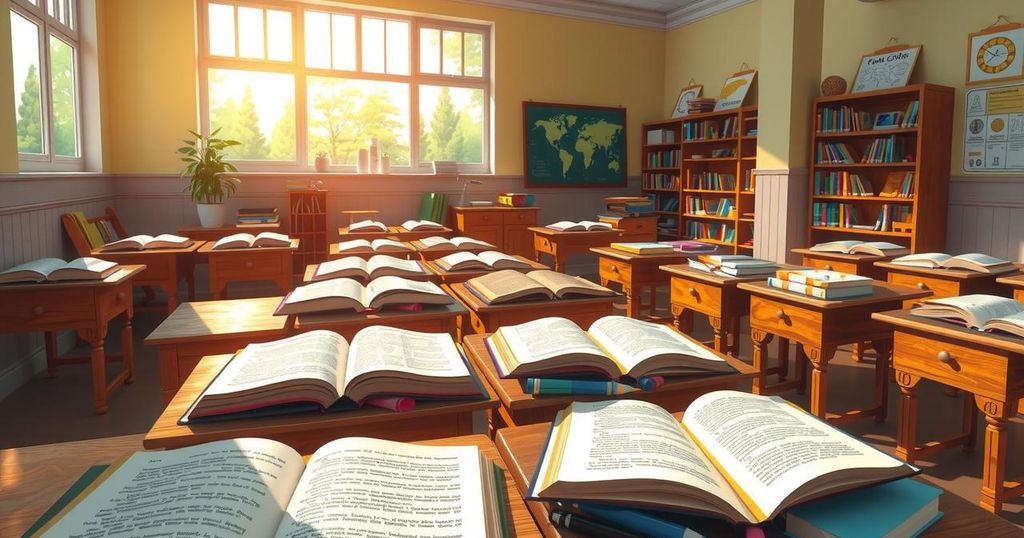Peru’s Education Year Initiates Amid Political Challenges and Protests
The 2025 school year in Peru begins amidst political turmoil, public protests, and serious deficiencies in the education system. President Dina Boluarte faced backlash during a ceremonial event, while significant educational infrastructure issues persist. Concerns regarding rising crime and ineffective governance are compounded by alarming statistics about school conditions, raising questions about the future of education and safety in Peru.
The commencement of the 2025 academic year in Peru is overshadowed by significant political unrest and concerns surrounding the education system. Notably, President Dina Boluarte encountered public hostility during a ceremony at the G.U.E. Inc. Garcilaso de la Vega school in Cusco, where her pre-recorded message was met with boos, reflecting escalating dissatisfaction with her administration. Reports indicate that 57 schools in Cusco are facing serious deficiencies, arousing scrutiny regarding educational quality and student safety.
In addition, former President Martín Vizcarra addressed the detrimental political climate impacting education during his visit to Huancayo. He noted a decline in support for Keiko Fujimori, particularly following the death of her father in 2024. Vizcarra expressed concerns, stating, “Without Alberto, many of her former voters are reconsidering their support,” and criticized the ineffective coalition between Boluarte’s government and various political parties, which he labeled as a government of failures.
Further exacerbating the situation, students at school No. 70549 “Virgen del Carmen” in Juliaca began their academic year outdoors due to severe flooding in their classrooms. Director Rolando Aréstegui Apaza highlighted the urgent necessity for over 15 million soles for necessary infrastructure repairs and reported that the school only offered distance learning. Protests ensued from parents demanding immediate reconstruction efforts from the local government.
Alarmingly, Wilber Vega Mendoza, Ayacucho’s Ombudsman, reported that 63% of schools in the region require complete rebuilding. He emphasized that many institutions lack essential functions, stating, “Over half our schools fail to provide minimum conditions for learning, exposing students and teachers to unsafe environments.” Moreover, approximately 60% of schools lack basic sanitation, complicating funding claims for repairs.
The educational crisis is accompanied by rising crime rates, as evidenced by violent incidents in Trujillo, La Libertad. A mugging victim was shot after withdrawing cash, while another man was murdered in his vehicle, illustrating the increasing violence within the community. Governor César Acuña criticized the ineffectiveness of local safety plans, insisting, “It should not happen, especially not within the heart of Trujillo. “.
In Lambayeque, a chaotic incident unfolded when attendees at the Aventura nightclub were injured by tear gas, prompting an immediate venue closure by local authorities, as investigations into the source of the gas began. Concurrently, the Maynas Provincial Municipality of Loreto is struggling to collect municipal fees due to the repeal of ordinance regulations by the city council, jeopardizing public services; Juan Carlos García Mimbela remarked on efforts to improve collection of outstanding debts.
Amidst these intertwining issues of governance, violent crime, and educational failings, Peru confronts a critical juncture as the new school year begins, leaving citizens uncertain regarding the accountability and effectiveness of their leaders in addressing these urgent challenges.
In summary, the 2025 academic year in Peru is launched amidst significant uncertainties stemming from political instability, deteriorating educational conditions, and rising crime rates. Public dissatisfaction with the government is palpable, as exemplified by protests and critical observations from former political leaders. With urgent challenges requiring immediate attention, the response of governing bodies will be critical in shaping the future of education and public safety in the country.
Original Source: evrimagaci.org




Post Comment